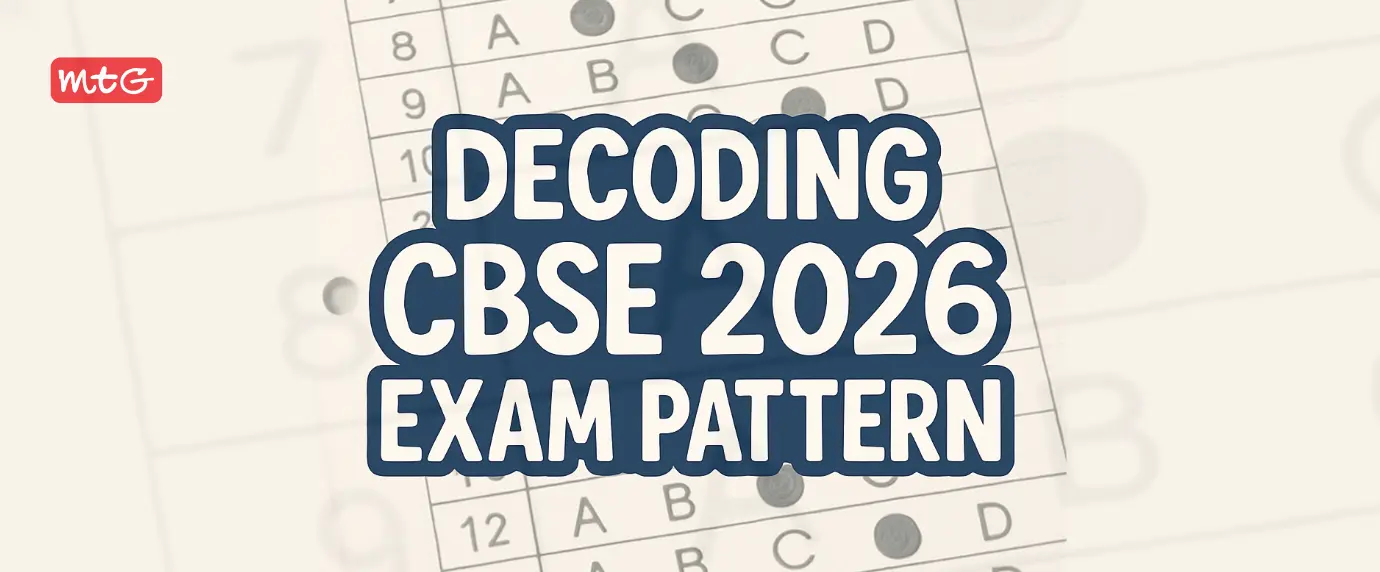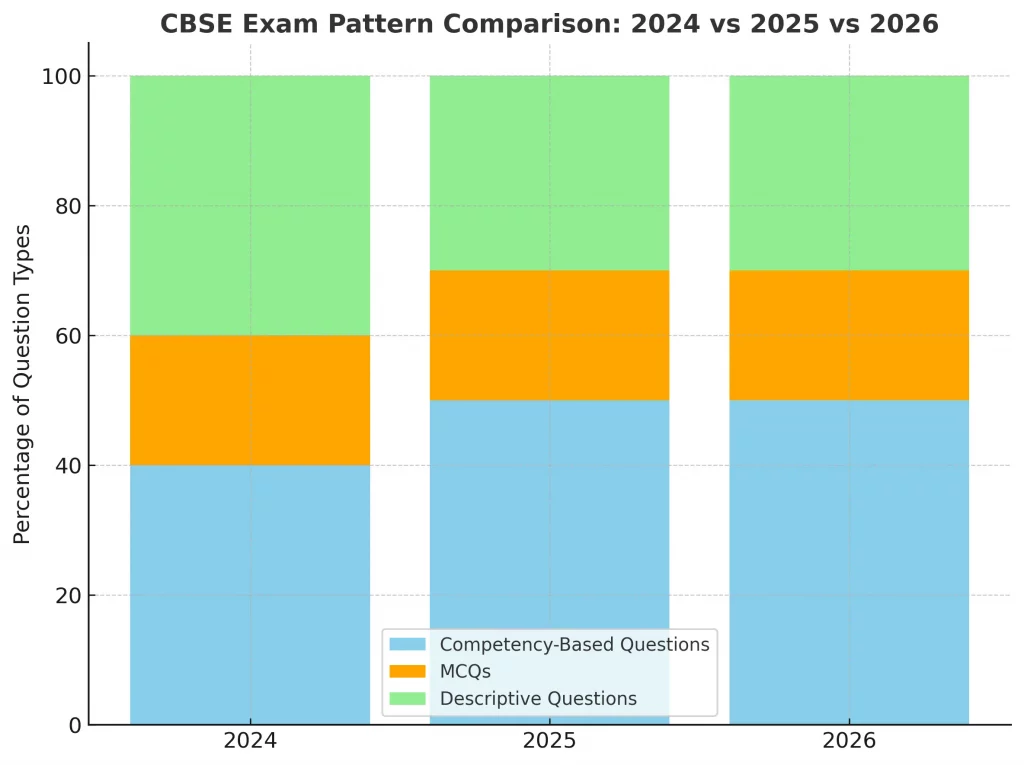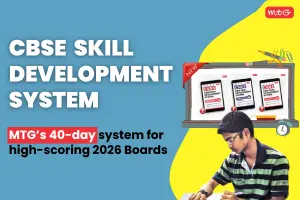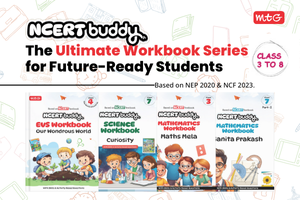
The Central Board of Secondary Education (CBSE) has introduced significant changes to its exam pattern for Classes 10 and 12 in recent years,aligning with the National Education Policy 2020 (NEP 2020). These changes are aimed at encouraging deeper understanding of concepts and reducing rote memorization. In this post, we compare the 2025 board exam structure with the 2026 pattern for both Class 10 and Class 12, highlighting what’s new, what’s unchanged, and how students and educators should adapt. Key topics include the latest exam blueprint (question format and weightage), the rise of competency-based questions, the introduction of twice-yearly board exams from 2026, and preparation strategies (with resources like MTG’s ScoreMore sample paper books aligned to the new pattern).
CBSE Board Exam Pattern 2025: Blueprint Updates and Changes
Class 10 and 12 Blueprint in 2025: For the academic year 2024–25 (board exams held in 2025), CBSE implemented a revised question paper structure emphasizing application-based learning. Both Class 10 and Class 12 board exams in 2025 followed a similar blueprint: 50% of the questions were competency-focused (case studies, source-based integrations, etc.), 20% were objective type (MCQs), and the remaining 30% were traditional short or long answer type. This represented a major shift especially for Class 12, which previously (2024 exams) had only 40% competency-based questions and 40% long-answer questions – the long-answer portion was reduced to 30% in 2025 to make room for more applied questions. Class 10 had already moved to a 50% competency question weightage by 2024, so its pattern in 2025 remained the same as the previous year.
What Changed in 2025: The enhanced focus on competency-based questions was a notable change in 2025. According to CBSE’s curriculum updates, the board explicitly increased the number of problem-solving and case-study questions in both Class 10 and 12 papers. The goal was to assess higher-order thinking skills and real-world application of knowledge rather than direct recall of facts. Meanwhile, the proportion of traditional descriptive questions (where students write long answers) dropped by 10%, reflecting this shift. CBSE officials emphasized that this new pattern would discourage rote memorization and instead test students’ conceptual understanding and ability to apply concepts in novel situations.
Exam Format and Schedule in 2025: The 2025 board exams for both classes were conducted in the usual single annual sitting (pen-and-paper, Feb–April 2025) following the full syllabus. Along with the new pattern, CBSE released official sample papers and marking schemes early in the year to illustrate the format. Teachers and students were advised to study these samples to understand the type of MCQs, case-based, and construct-response questions that would appear. Overall, the 2025 exams marked a transition to the NEP-aligned format: half the paper focusing on competency and critical thinking, and a reduced emphasis on lengthy theoretical answers.
CBSE Board Exam Pattern 2026: Continuity and Key Changes
By 2025, schools and students had largely adapted to the new question format, and CBSE chose to maintain this blueprint in 2026 for stability. There was no further change in the question paper structure or weightage for 2025–26: the Class 10 and 12 exam format, distribution of question typologies (50% competency, 20% MCQ, 30% descriptive), and overall assessment scheme remain exactly the same as in 2024–25. CBSE confirmed in its circular that the format, weightage, and evaluation process for 2026 board exams are unchanged, providing continuity and clarity for educators and learners who adjusted to the 2025 pattern. The official Sample Question Papers for 2026, released on the CBSE academic website, mirror last year’s pattern – giving students a consistent blueprint to practice with.
However, 2026 brings a major structural change in how exams are conducted, particularly for Class 10:
Starting with the 2025–26 session, CBSE will conduct the Class 10 board examinations in two phases each year to reduce the high-stakes pressure on students. The first exam session will be held in February 2026 (as the main exam) and is mandatory for all Class 10 students, while a second session in May 2026 will be optional, allowing students to improve their scores in up to three subjects if they wish. This two-tier exam schedule is a direct implementation of NEP 2020’s recommendation to offer multiple opportunities and eliminate “one-shot” exam stress.
Twice-a-Year Board Exams (Class 10): Under this new scheme approved by CBSE, Class 10 students get a second chance within the same academic year to better their performance. All students must sit for the Phase 1 exams in Feb 2026, covering the full syllabus, just like a traditional board exam. Then, after results of Phase 1 are out (expected by April), those who are not satisfied or wish to target higher scores can opt for the Phase 2 exams in May 2026 for improvement. Importantly, the second phase is optional and limited: a student can choose to re-attempt up to three subjects (e.g. Science, Math, Social Science, or Languages) for improvement. The better score of the two attempts for those subjects will be counted in the final result. Students in winter-bound schools (with shorter academic years) are given the flexibility to take the board exam in either of the two phases as per their schedule. All internal assessments or practicals will still be conducted once per year, not twice.
What about Class 12? As of 2026, the twice-a-year board exam policy has been formally implemented for Class 10 only. There is no official confirmation of Class 12 boards being held twice in 2026; Class 12 exams in 2025–26 are expected to follow the usual single annual schedule. (However, NEP 2020 envisions offering multiple opportunities for Class 12 as well in the future, so similar changes may be on the horizon for senior students. For now, Class 12 students in 2026 should prepare for a one-time board exam, albeit with the same competency-based paper pattern introduced in 2025.)
Read more about the change: CBSE confirms two-session exam plan for class 12

Major Shifts in Question Typologies and Weightage (2025 vs Earlier)
One of the biggest shifts in the CBSE exam pattern has been in the types of questions asked and their weightage, as seen by comparing the pre-2025 papers to the 2025–26 format:
- Competency-Based Questions – 50%: These are questions designed to test application of knowledge and higher-order thinking. They may be presented as case studies, data-based problems, open-ended scenarios, or integrative questions often set in real-life contexts. In the new pattern, roughly half of the theory paper’s marks come from such competency-focused items. (For instance, a Science paper might include case-based questions where students interpret an experiment’s data, or a Language paper might have passage-based questions requiring analysis.) This 50% weightage is a sharp increase – earlier, competency or case-based questions might have been ~20–30% of the paper. By 2025, CBSE ramped it up (Class 12 went from 40% in 2024 to 50% in 2025) to align with NEP’s push for conceptual and analytical skills. The emphasis on these questions means students must understand concepts deeply and be able to apply them, rather than simply memorizing answers. As CBSE noted, the exam is now designed to “assess students’ ability to apply knowledge in real-world scenarios” and encourage logical reasoning.
- Multiple-Choice Questions (MCQs) – 20%: One-fifth of the board exam marks are allotted to MCQs or other select-response type questions. These include straightforward one-mark questions, assertion-reason type items, or even very short answer fill-in-the-blanks. The 20% MCQ component is intended to test a breadth of knowledge quickly and to promote critical thinking under time constraints. For students, this means practicing objective questions is crucial – you need speed and accuracy. Notably, MCQs had a rising presence in CBSE exams over recent years; even before 2025, papers started including more objective questions. The continuity of 20% MCQs in 2026 signals that students should expect a significant portion of quick, knowledge-check questions in every subject.
- Constructed Response (Short/Long Answer) – 30%: The share of traditional descriptive questions (short answers, long essays, problem solutions, etc.) has been reduced to about 30% of the paper. This is a notable reduction from previous patterns (earlier, it was around 40% or more). While students still must prepare to write out answers, the lengthy theoretical section is no longer the dominant part of the paper. Each subject’s paper usually has a few long-answer questions (4–6 marks each) and some short-answer questions, but collectively they form less than one-third of the total marks now. This change implies that excelling in boards is not only about writing pages of answers; it’s equally (if not more) about solving novel questions and picking the right options in MCQs. Students should still hone their writing and presentation skills for clarity and precision, as 30% is significant – but they should allocate study time wisely given that 70% of marks come from other formats.
Why this Shift Matters: The revamped typology directly affects how students should study and practice. With half the exam testing competencies, rote learning is insufficient. Students who understand concepts and can think critically will have an edge. The inclusion of more MCQs and case-based questions introduces an element of time pressure and requires quick analytical thinking. On the positive side, these changes can make exams more engaging and reduce reliance on memorizing long answers – a well-prepared student can score via clear concepts and reasoning. From a broader perspective, CBSE’s adjustments are meant to produce graduates who are better problem-solvers and ready for competitive exams, which often have similar objective/aptitude components.
Impact on Students’ Preparation Strategy
These pattern changes in 2025–26 inevitably call for a change in preparation strategy for students:
- Conceptual Mastery over Rote Learning: Students need to focus on truly understanding their syllabus. Since many questions are application-based or unseen case studies, memorized answers won’t directly help. Building a strong conceptual foundation in each subject is crucial. For example, instead of only memorizing formulae or definitions, students should practice applying them to different problems or scenarios. This will help tackle competency-based questions that twist or contextually use concepts.
- Regular Practice with New Question Forms: It’s important to practice a wide variety of questions – especially the newer formats. Solve case studies in science and social science, data-based questions in mathematics, assertion-reason questions in subjects like Biology or Economics, and so on. Make use of sample papers and question banks that reflect the latest pattern (many of which now include ample MCQs and case-integrated questions). Timed practice of MCQs can improve speed, while practicing structured answers for long questions maintains your answer-writing skills. Remember, the official CBSE sample papers for 2025–26 are modeled closely on the actual exam format – use them as a benchmark to gauge the level of questions and adjust your preparation accordingly.
- Time Management Skills: With a mixed paper (MCQs + case studies + long answers), managing time in the exam is tricky. You’ll likely have lots of one-mark questions to zip through, as well as a few that require deeper thought. Practice writing full-length mock exams in 3 hours to develop a strategy: for instance, some students prefer to quickly do all MCQs first, then tackle case-based or long answers. Others might start with long answers while fresh. Identify what works for you. The new pattern’s balance means you can’t afford to spend too long on any single answer. Regular practice will help you learn to allocate time (e.g. 1 minute per MCQ, 5-7 minutes per 5-mark question, etc., depending on the paper).
- Stay Updated and Adaptive: Especially for competency questions, CBSE can incorporate real-life scenarios or current examples. Stay informed (for subjects like Social Science or General Science) about basic current events or contemporary issues related to your syllabus – sometimes case studies are framed around practical situations. Being generally aware can help you write relevant answers. Also, be ready to adapt to the unexpected: the whole point of competency questions is to test your ability to apply knowledge in new contexts, so expect the unexpected and approach such questions calmly and logically. Developing a habit of analytical thinking (for example, by discussing “what-if” scenarios in class, or solving puzzles) can sharpen your mind for these questions.
- Plan for Two Board Exam Attempts (for Class 10): If you’re a Class 10 student in 2025–26, you should plan your study schedule with the two-phase exam in mind. Do not treat the first exam as a mock – it’s mandatory and should be given your full effort. The second exam (May 2026) is a safety net for improvement, not a substitute for proper preparation. Ideally, aim to perform your best in February so that you may not even need the retake. But knowing a second chance exists, you can reduce your exam anxiety. If you do intend to use the improvement exam, be strategic: identify which subjects you might want to improve (perhaps the ones you find toughest or that matter most for your stream selection) and keep revising those even after the first phase, instead of dropping study entirely post-February. Also, factor in that your school year will effectively extend till June if you take the second exam, so manage your time for rest and further study accordingly. (For Class 12 students, while a second annual exam isn’t available in 2026, the concept might arrive soon; regardless, focus on the single board exam, but take cues from the Class 10 changes to manage stress – consistent performance through the year can be more valuable than last-minute cramming.)
Helpful downloads:
Free CBSE Class 12 Sample Papers (2025–26) PDF
Free CBSE Class 10 Sample Papers (2025–26) PDF
Leveraging Sample Papers and Resources for the New Pattern
One of the best ways to adapt to the revamped exam pattern is through extensive practice with up-to-date sample papers. CBSE itself releases Sample Question Papers (SQPs) each year which are a must-do – they are modeled on the actual paper and come with detailed marking schemes. Practicing these gives students insight into the expected question formats and how answers are evaluated. In fact, CBSE’s 2026 sample papers were released as early as mid-2025 to allow plenty of preparation time, and the board emphasized that schools and teachers use these as a guide to align teaching with the exam standards. By solving official sample papers under timed conditions, students can fine-tune their exam strategy and identify areas needing improvement.
In addition to official samples, there are excellent third-party resources geared towards the new CBSE blueprint. For instance, MTG’s ScoreMore series of sample paper books are specifically crafted to meet the latest CBSE exam pattern. These books provide:
- 15 full-length sample papers per subject, based on the exact CBSE blueprint (including the 50% competency-based questions).
- Coverage of all question typologies – from MCQs and case studies to long answers – reflecting the proportions and styles seen in actual exams.
- Competency-based questions integrated in every paper, so students get ample practice in tackling them.
- Detailed solutions and marking schemes for self-evaluation.
Using such resources can greatly boost confidence. As per MTG’s records, a large portion of questions in board exams often end up being similar in style or concept to those in these preparatory books. While it’s not about exact repetition, the familiarity with problem types and rigorous practice can help students avoid surprises on exam day.
Tip: When using sample paper books, start with one paper to diagnose your performance. Identify whether time management was an issue or if certain sections (say, case-based questions) were tougher. Then revisit those weak areas in your textbooks or with your teacher, and attempt more papers focusing on improving those. This cycle of practice and feedback is key to mastering the new pattern.
Recommended MTG Resources
ScoreMore Class 10: 15 Full-Length Papers per Subject
10-Year Chapterwise Topicwise Solved Papers for Class 10 and 12
100 Percent Series for Classes 11 & 12
Conclusion
The CBSE exam pattern for 2025 and 2026 marks a transformative step towards a more application-oriented and student-friendly assessment system. The core blueprint – with its balanced mix of competency-based questions, MCQs, and written responses – is here to stay for 2026, allowing students to prepare with a clear understanding of what to expect. The introduction of twice-a-year board exams for Class 10 is a bold move aimed at reducing stress and giving students additional opportunities to succeed. Together, these changes align with the broader vision of NEP 2020: to make exams a test of understanding rather than memory, and to make the assessment process more flexible and less daunting for learners.
For students, the challenge is to embrace these changes proactively – by shifting study habits towards conceptual learning and consistent practice. For parents and teachers, the role is to provide guidance, resources, and an environment conducive to this new approach. With the right strategies – and tools like updated sample papers (ScoreMore and others) – students can not only adapt to the new CBSE paper pattern but also excel in it.
In essence, preparation for the “new” CBSE exam pattern is about smarter, not just harder, work. Focus on learning and application, make the most of the available practice opportunities, and approach the exams (whether it’s the first attempt or the second) with confidence. These reforms are ultimately designed to benefit students’ learning outcomes, and with diligent effort, CBSE aspirants can score more and learn more under the 2025–26 pattern. Good luck to all the Class 10 and 12 students gearing up for the boards – decode the pattern, prepare strategically, and you’ll be well on your way to success!































